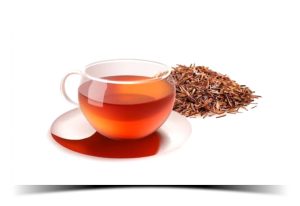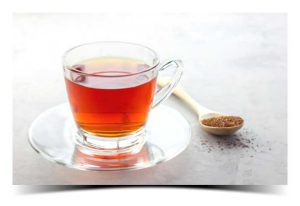The Ultimate Guide: Benefits of drinking rooibos tea for skin

(Benefits of drinking rooibos (red) tea for skin)
Rooibos tea, also known as red bush tea, has gained immense popularity worldwide for its rich flavor and impressive health benefits. This herbal tea, grown exclusively in the mountainous Cederberg region of South Africa, is caffeine-free and packed with antioxidants and nutrients that can enhance wellness on multiple levels. One of its most appealing benefits, especially in beauty circles, is its positive impact on skin health. Here, we’ll explore in detail the remarkable ways drinking rooibos tea can benefit your skin, touching on its natural compounds, specific advantages, and practical tips for maximizing its skin-boosting effects.

What is Rooibos Tea?
Rooibos tea comes from the leaves of the Aspalathus linearis plant, which is native to South Africa. Unlike traditional teas (like green or black), rooibos isn’t made from the Camellia sinensis plant and doesn’t contain caffeine. The leaves are oxidized, giving rooibos its distinct red-brown color and enhancing its naturally sweet flavor.
The tea is rich in antioxidants, particularly aspalathin and nothofagin, as well as minerals like zinc, magnesium, and iron, which contribute to its medicinal and therapeutic properties. Historically, rooibos has been used in South African traditional medicine for various health issues, from digestive disorders to skin ailments.

The Nutrient Profile of Rooibos Tea and Why It Matters for Skin
Rooibos tea is packed with nutrients and bioactive compounds, each playing a unique role in supporting skin health:
1.Antioxidants: Rooibos is particularly high in antioxidants, which help fight free radicals—unstable molecules that damage cells, accelerate aging, and increase the risk of various diseases. Two key antioxidants found in rooibos, aspalathin and nothofagin, are rare in other plants and are especially effective in protecting against oxidative stress.
2.Polyphenols: These plant compounds have anti-inflammatory and anti-viral properties, which can reduce inflammation and irritation in the skin. Polyphenols can also improve blood flow, enhancing the skin’s natural radiance.
3.Alpha Hydroxy Acid (AHA): Rooibos tea is one of the few natural sources of alpha hydroxy acid, known for its exfoliating and rejuvenating effects on the skin. AHAs are commonly used in skincare for their ability to help remove dead skin cells and reduce fine lines.
4.Minerals: Rooibos contains zinc, magnesium, and calcium—minerals that play essential roles in skin repair and maintaining a healthy moisture balance.
5.Quercetin: This is another powerful antioxidant that has anti-inflammatory and anti-allergic effects, helpful for people with sensitive or acne-prone skin.

Benefits of Drinking Rooibos Tea for Skin Health
Rooibos tea’s nutrient profile contributes to a host of skin benefits. Here are some of the primary reasons why incorporating rooibos tea into your daily routine can support healthier, more radiant skin.
1.Helps Combat Signs of Aging
Oxidative stress from free radicals is a major contributor to skin aging. Free radicals damage skin cells, leading to the breakdown of collagen and elastin—the proteins responsible for keeping skin firm, smooth, and youthful. The antioxidants in rooibos tea, particularly aspalathin and quercetin, combat these free radicals, helping to protect against premature wrinkles, fine lines, and sagging skin.
Drinking rooibos tea regularly can help maintain your skin’s elasticity and smoothness over time. Some studies even suggest that rooibos can stimulate collagen production, adding to its anti-aging benefits.
2.Soothes Inflammation and Redness
Chronic inflammation can lead to various skin issues, including redness, irritation, and swelling. Conditions like eczema, psoriasis, and rosacea often involve significant inflammation. Rooibos tea’s polyphenols, particularly flavonoids, have strong anti-inflammatory properties that can reduce skin redness and irritation.
Drinking rooibos tea regularly may help calm inflamed skin from the inside out, while topical application can provide immediate relief for redness and itching. People with sensitive skin might also find rooibos beneficial due to its gentle, non-irritating properties.
3.Aids in Acne Prevention and Healing
Acne is often caused by a combination of factors, including hormonal imbalances, bacteria, inflammation, and oxidative stress. Rooibos tea can be beneficial for acne-prone skin due to its anti-inflammatory and antibacterial properties. The zinc content in rooibos plays a crucial role in balancing oil production and healing damaged skin. Zinc is also effective at killing the bacteria responsible for acne outbreaks, potentially reducing breakouts when consumed or applied topically.
Additionally, rooibos tea’s unique antioxidant profile helps reduce acne-related inflammation and scarring. Regular consumption might not only reduce the occurrence of acne but also help the skin heal faster from past breakouts.
4.Encourages Skin Moisturization and Smoothness
Staying hydrated is essential for keeping skin looking plump and glowing, and rooibos tea can contribute to this. Unlike caffeinated drinks, which can dehydrate the skin, rooibos tea is hydrating and replenishing. Its mineral content, especially calcium and magnesium, helps improve the skin’s moisture levels and elasticity.
Drinking rooibos tea can help balance your skin’s hydration levels, which is particularly beneficial for people with dry or sensitive skin. Furthermore, its natural alpha hydroxy acids gently promote skin exfoliation, helping to keep skin smooth, soft, and free from rough patches.
5.Offers Natural Protection Against Sun Damage
Sun exposure is one of the leading causes of skin aging, sunburn, and even skin cancer. While drinking rooibos tea won’t replace sunscreen, the antioxidants it provides can offer some natural protection against sun damage. Aspalathin and nothofagin work to neutralize free radicals generated by UV radiation, which means that consuming rooibos tea may help mitigate some of the oxidative damage caused by the sun.
Furthermore, rooibos’ flavonoids might also enhance the skin’s natural resistance to UVB rays, which are primarily responsible for sunburn and sun-induced skin damage.
6.Supports Wound Healing and Skin Repair
If you’re dealing with blemishes, scars, or wounds, rooibos tea might assist in the healing process. Rooibos is packed with minerals like zinc and magnesium that support the skin’s ability to repair itself. Zinc is especially known for its wound-healing properties, promoting faster recovery from cuts, abrasions, and minor injuries.
This tea’s anti-inflammatory and antimicrobial properties can also help prevent infection, making it useful for soothing and healing minor skin injuries. Rooibos’ gentle compounds mean it’s well-suited for sensitive skin, which often reacts poorly to harsher skin treatments.
7.Reduces Skin Hyperpigmentation and Dark Spots
Hyperpigmentation, or the appearance of dark spots, often occurs due to sun exposure, hormonal changes, or aging. Rooibos tea may help reduce hyperpigmentation due to its antioxidant and anti-inflammatory effects. The natural polyphenols and flavonoids in rooibos can reduce melanin production and, over time, help fade dark spots and even out skin tone.
Moreover, rooibos’ alpha hydroxy acid gently encourages skin cell turnover, which can gradually reduce pigmentation and improve the skin’s overall brightness.
How to Incorporate Rooibos Tea into Your Skincare Routine
There are several ways to incorporate rooibos tea into your skincare routine to take advantage of its benefits:
1.Drink Rooibos Tea Daily: The simplest way to experience rooibos’ skin benefits is to drink it daily. Try to incorporate 1-3 cups of rooibos tea into your daily routine. Since it’s caffeine-free, it’s suitable for any time of day, even in the evening.
2.Use Rooibos Tea as a Facial Toner: Brew a cup of rooibos tea, let it cool, and use a cotton ball to apply it to your skin as a toner. Rooibos tea can help tighten pores, reduce redness, and provide a natural layer of antioxidants on the skin.
3.Add Rooibos Tea to Face Masks: Mix cooled rooibos tea into homemade face masks with ingredients like honey, yogurt, or oatmeal. This combination provides an extra antioxidant boost and helps nourish the skin.
4.Rooibos-Infused Skincare Products: Today, many skincare products, from creams to serums, include rooibos extract. These products can deliver rooibos’ benefits directly to the skin and might be especially useful if you prefer not to make DIY products.
Potential Side Effects and Considerations
We have already learned about the benefits of drinking Rooibos (red) tea for skin care. Rooibos tea is generally considered safe, but it’s essential to approach any new addition to your skincare routine mindfully. Here are a few considerations:
1.Allergic Reactions: Although rare, some people may experience mild allergic reactions. If you’re using rooibos tea topically, it’s always wise to do a patch test first.
2.Pregnancy: While rooibos is caffeine-free and considered safe for most people, consult your healthcare provider if you’re pregnant or breastfeeding before making it a daily habit.
3.Balance in Diet: Drinking rooibos tea alone won’t replace other elements of a balanced diet and good skincare routine. It’s best used as a complement to a holistic approach to skincare.
Final Thoughts
Rooibos tea is a powerful, natural way to support healthy, glowing skin. Its antioxidants, minerals, and anti-inflammatory compounds provide a range of skin benefits, from fighting premature aging and reducing inflammation to soothing irritation and improving overall complexion. So you too can make a habit of drinking Rooibos or red tea from today for its skin benefits.




